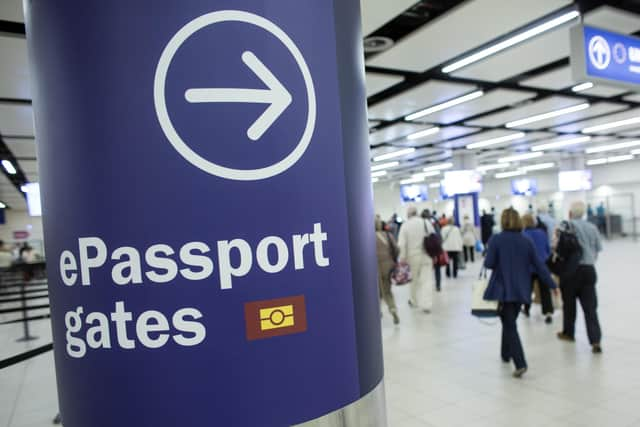No foreign holidays until August as Scotland to enforce 14-day quarantine
Announcing the measure would come into force from 8 June, Home Secretary Priti Patel warned: “This is absolutely not about booking holidays. We want to avoid a second wave and that is absolutely vital.”
Devolved governments have been consulted and restrictions will apply at airports in Scotland and the other nations of the UK.
Advertisement
Hide AdAdvertisement
Hide AdBusiness groups branded the move “isolationist” and airlines warned it would make a return to normal flight schedules impossible until the end of the summer.


Airline Jet2 cancelled its schedule of holiday packages for June yesterday as the news broke.
However, it said flights would resume in July, setting up a clash with the government along with low-cost carrier Ryanair, which declared that “Europe is open” and put thousands of seats on sale.
Only people arriving from Ireland, who are covered by the Common Travel Area, will be exempt. Hopes raised by earlier government statements that arrivals from France would also escape quarantine were dashed, with only a short list of workers including hauliers, medics and agricultural workers able to cross the Channel freely.
Last night the Home Office confirmed that the offshore industry’s international workforce would be covered by the exemption, after earlier failing to include oil and gas workers on the list of those able to escape quarantine.
Opposition parties said the measure, which comes four months after the first case of coronavirus in the UK was confirmed in an arrival from overseas, was too late.
“If quarantine is needed, it should not have taken so long for measures to be introduced,” Labour’s shadow Home Secretary Nick Thomas-Symonds said. “Too little thought has been given to testing and screening at airports.”
The SNP’s home affairs spokeswoman Joanna Cherry said the UK was “behind the curve and out of step with international best practice”.
Advertisement
Hide AdAdvertisement
Hide Ad“Other countries have had public health measures in place at their airports and ports for months and indeed some are now in a position to ease these controls,” she said.
Ms Patel defended not having imposed the restriction earlier, saying passenger arrivals are down 99 per cent on the previous year but the UK must “guard against imported cases” now the peak is passed.
“The answer as to why we’re bringing in these measures now is simple: It is to protect that hard-won progress and prevent a devastating resurgence in a second wave of the virus,” she told the Downing Street press conference. “We are taking it at a time that it will be the most effective.”
Anyone arriving by air, sea or rail will be advised to use personal transport to head to their accommodation and once there not leave for 14 days, the likely maximum incubation period for Covid-19.
They will not be allowed to accept visitors, unless they are providing essential support, and should not go out to buy food or other essentials “where they can rely on others”, the department said.
Passengers will have to provide their contact and travel information so they can be traced if infections arise, and they could face random checks from public health authorities to ensure compliance during the 14-day period.
Breaches will be punishable by £1,000 fines in England, with devolved nations setting out their own penalties.
Border Force will be able to refuse entry to foreign citizens who are not UK residents during border checks while removal from the country could be used as a last resort, the Home Office said. If accommodation does not meet necessary requirements - with hotels, or with friends and family listed as options - travellers will have to pay to self-isolate in accommodation arranged by the Government. Seasonal agricultural workers will self-isolate on the property they are working.
Advertisement
Hide AdAdvertisement
Hide AdOfficials said that those the new entrant is staying with would not need to quarantine, but they should avoid contact with each other where possible.
Chief scientific adviser Sir Patrick Vallance said testing at the border would not be effective in reducing transmission because cases are hard to detect soon after infection. “You start to test positive maybe at around five days, maybe a bit sooner, and you may be shedding a lot of virus for a couple of days then and for a few days afterwards,” he said.
Ministers are still considering the creation of “air bridges” linking the UK to destinations that have low coronavirus transmission rates, but Ms Patel said that idea was “not for today”.
Holiday destinations like Spain, Italy and Greece has begun making plans to salvage their tourist economies by submitting overseas visitors to a strict testing regime on arrival, but Greece’s tourism minister warned this week that the UK’s coronavirus outbreak was not sufficiently under control for the country to be added to a “white list”.
Virgin Atlantic responded by saying that “the Government’s approach will prevent flights from resuming. There simply won’t be sufficient demand to resume passenger services before August at the earliest.”
Holiday company Tui has said all customers with trips booked in June, July and August will have the chance to postpone.
Stephen Phipson, the chief executive of manufacturers association Make UK, branded the move “isolationist” and warned it would cut off the supplies of air freight that travels as cargo on passenger flights.
Earlier, the chief executive of the Airport Operators Association, Karen Dee, told the Commons home affairs committee that drastic reductions in passengers “may simply lead to a prolonged shutdown of all aviation”.
Advertisement
Hide AdAdvertisement
Hide AdThe Airlines UK trade body said thousands of jobs and the economy’s recovery would be jeopardised by the plan, and called for ministers’ three-week reviews to be “robust, transparent and evidence-led”.
Comments
Want to join the conversation? Please or to comment on this article.